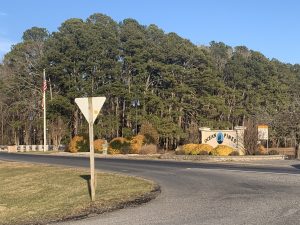
Ocean Pines is known for its forested landscape. The Environment and Natural Assets Advisory Committee is concerned about excessive cutting of trees destroying existing habitats and the community character.
By Cindy Hoffman, Staff Writer
(Jan. 11, 2024) Trees are part of the natural beauty of Ocean Pines. But as the community ages, so do the trees.
The OPA Environment and Natural Assets Advisory Committee is encouraging the planting of new trees both in public areas and on residential lots.
“Ocean Pines is getting to an age where many trees are reaching their age limit. They are dying and they are getting cut down. We are losing our tree habitat,” said Tim Peck, the chair environment committee.
The committee recently submitted recommendations in its annual report to the board of directors to plant trees in the common areas, including White Horse Park.
One free source of seedlings is Maryland DNR. Through a program called “Nuts about Acorns,” the state works with volunteers to collect nuts and acorns from native trees to replenish the state’s nursery. It also gives away “backyard buffer tree bundles” to Worcester County residents. Twenty seedlings are included in each bundle and varieties vary from year to year. To take advantage of this program, visit berlinmd.gov/bybtrees2022/
Beyond reforestation, the environment committee is also interested in preserving the current native trees in Ocean Pines.
The Ocean Pines Compliance, Permits and Inspections Department states that its objective “is to preserve the natural beauty and setting of Ocean Pines and to prevent indiscriminate clearing of property, removal of trees, and earth moving.”
The permit protocol to remove a tree states that a tree must be dead or dying, diseased, rotting, storm-damaged, dangerous, within 10 feet of a foundation, within three feet of a driveway or could damage a bulkhead.
In its annual report to the board, the committee noted “there appeared to be some lack of control of tree cutting as intended by established Ocean Pines guidelines where new building lots in all areas of Ocean Pines were commonly clear-cut of trees and tree cutting around existing homes seemed to be increasing at a rate much higher than several years ago.”
The committee has encouraged association officials to keep the cutting under control, according to Peck. The committee has not received detailed feedback on this issue.
The Architectural Review Committee guidelines state that native magnolia, holly, bayberry and laurel are protected plants. Permits for removal of these species may be approved if they are diseased, dangerous or impair vision for driving.
The county regulates critical areas where homes are within 100 feet of a waterway. These landowners have to put down a deposit, and that gets returned if they mitigate their tree-cutting practice on their lot.
“Our committee has observed that typically, they [the new plantings] are not native, they are more ornamental, which defeats the purpose of preserving the natural tree habitat in Ocean Pines,” Peck said.
“Modifying the tree-cutting practice from practices followed several years ago is a significant change to the legacy of Ocean Pines and long-term vision of our community that was established over 50 years ago,” the committee said in its annual report.
“The excessive cutting of trees destroys existing habitats, significantly contributes to conditions of flooding in OP, and degrades runoff into OP canals. Considering that current patterns of rainfall include increasing high rainfall storm events, the removal of trees and increasing paved areas will exponentially increase flooding in OP. The long-term impacts of this problem will translate to very high infrastructure costs due to flooding damage and mitigation efforts. In addition, water quality in the canals will decline.”
Trees also protect local wildlife. In its annual report, the committee expressed concern for the impact of tree cutting on the east side of the South Pond, “essentially evicting turtles from their landing.”
The committee requested a log be placed in the water in that area to restore this habitat. Using logs from trees that are being cut down by the Public Works Department would save money, Peck said.
Also regarding the South Gate Pond, the committee has been researching options for controlling the geese population.
The committee has recommended egg addling at this pond. Addling, or shaking the eggs, is a common process used to stop the development of the egg, but a permit is needed to do so.
The committee has recommended habitat changes around the pond to deter geese from nesting. Geese will not nest in tall vegetation around the shoreline due to fears of hidden predators.
“Because of the nature of the land use around the pond, there has to be a combination of actions,” Peck said.
The issue can be more complicated at the South Pond, where people like to fish, according to Peck. If OPA implements these recommendation, it will not eliminate the goose population but will help control it.
The environment committee plans to be at the OPA Expo Day on April 20 to talk to residents about the many projects the committee is working on and educate them on environmental preservation.
